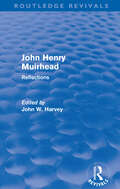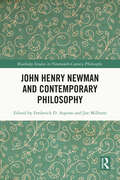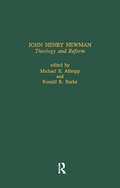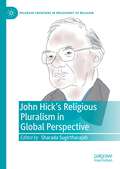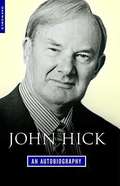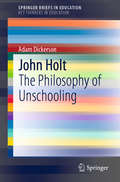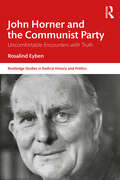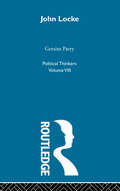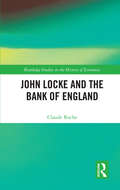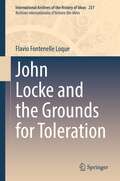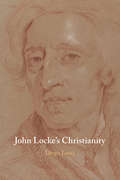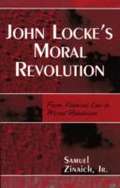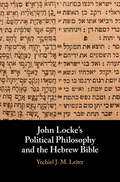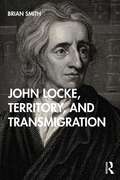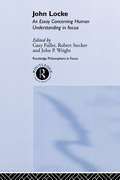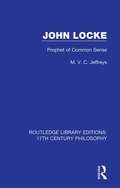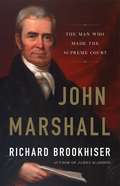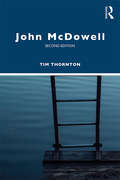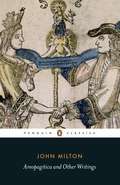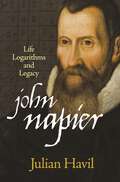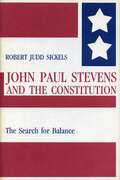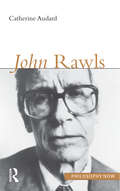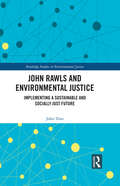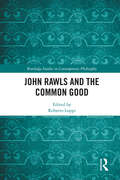- Table View
- List View
John Henry Muirhead: Reflections (Routledge Revivals)
by John W HarveyFirst published in 1942, Reflections documents the life of John Henry Muirhead and the philosophical age that he observed. The first part of the volume derives from Muirhead’s own autobiographical narrative, left unfinished when he died in May 1940. The second part features two final chapters written by John W. Harvey that comprehensively record the final stages of Muirhead’s life. Harvey’s chapters incorporate Muirhead’s unfinished final years of commentary and begin at the man’s retirement from Birmingham Chair in 1921. As a student and teacher of philosophy, Muirhead’s life ran almost precisely parallel to what he himself refers to as ‘one of the most vivid and important movements in British and American philosophy’. He came into contact with some of the age’s primary thinkers and as such, his own autobiography is important in providing an insight into his contemporary philosophical environment.
John Henry Newman and Contemporary Philosophy (Routledge Studies in Nineteenth-Century Philosophy)
by Frederick D. Aquino Joe MilburnWhile John Henry Newman’s writings have long received the attention of historians, theologians, and literary critics, they have largely been neglected by philosophers. However, Newman’s importance as a philosopher is just now beginning to be acknowledged.This volume brings together leading philosophers and Newman scholars to explore the contours of his philosophical thought and to show its relevance to contemporary philosophy. The chapters explore, develop, and evaluate Newman’s thought, considering recent work in epistemology, philosophy of religion, moral philosophy, and philosophy of education.John Henry Newman and Contemporary Philosophy will be of interest to scholars and advanced students interested in nineteenth-century philosophy, philosophy of religion, epistemology, moral philosophy, philosophy of education, and nineteenth-century religious thought.
John Henry Newman: Theology and Reform (Routledge Library Editions: 19th Century Religion Ser. #2)
by Michael E. Allsopp Ronald R. BurkeThis collection of papers grew out of a concern of several at Creighton University for the perduring nature of the thought of John Henry Cardinal Newman. Although Cardinal Newman died some one hundred years ago, his influence on today’s thinking is still strong. Like Sir Thomas More with his Utopia, Newman put forward an ideal of society and life which has a recognizable relation to the lasting possibilities open to humankind. First published in 1992. Routledge is an imprint of Taylor & Francis, an informa company.
John Hick's Religious Pluralism in Global Perspective (Palgrave Frontiers in Philosophy of Religion)
by Sharada SugirtharajahThis volume contains fresh scholarly contributions to mark the birth centenary of John Hick, the internationally well-known philosopher of religion, whose works continue to have significant global relevance in today’s religiously diverse and conflict-ridden world. His writings have reset the parameters of religious pluralism. Up till now, Hick’s religious pluralism has been mainly seen in relation to the Western context where Christianity is the predominant religion. This volume includes both Western and non-Western engagement with his thinking in contexts such as Japan, China, Korea, Nigeria, and India, where Christianity is a minority religion with little political power. Its distinctiveness lies in widening the debate on religious pluralism by bringing Hick’s pluralistic hypothesis into a constructive cross-cultural and interreligious conversation with scholars of Hinduism, Jainism, Daoism, Judaism, Christianity, Islam and African traditional religions. In doing so, this collection examines how Hick’s philosophy of religious pluralism has been received, appropriated and appraised by these scholars. It has been appreciated and critiqued in equal measure, and continues to impact on current thinking on religious pluralism. This volume makes a significant contribution to the debate initiated by Hick.
John Hick: An Autobiography
by John HickFrom his early conversion to evangelical Christianity to his role as a conscientious objector in World War II and his move towards religious pluralism, this book will be core reading for many courses taught on John Hick around the country.
John Holt: The Philosophy of Unschooling (SpringerBriefs in Education)
by Adam DickersonThis is the first-ever book to offer an analytical study of John Holt’s philosophy of education. It provides a clear analysis and critical evaluation of the key themes in his work, considers the main objections to his views, and discusses their relation to the contemporary homeschooling movement. The book examines Holt’s critique of compulsory education and his account of the relationships between learning, freedom, intelligence and character. It argues that Holt’s works contain a philosophically rich critique of instrumentalism in education, and thus continue to represent a significant challenge to many mainstream views on education today. Given its scope, the book will be of interest to anyone who wants to understand Holt’s work and influence as a critic of compulsory schooling; educators and education students; philosophers of education; and those seeking a better grasp of the ideas behind unschooling and homeschooling.
John Horner and the Communist Party: Uncomfortable Encounters With Truth (Routledge Studies in Radical History and Politics)
by Rosalind EybenJohn Horner and the Communist Party is a biography of a leading trade unionist and activist who became disillusioned with the Communist Party.Known for creating the modern Fire Brigades Union during the Second World War, John Horner (1911-1997) resigned from the Communist Party in 1956. Formerly one of the Party’s leading members, he afterwards refused to speak or write about his communist past. Horner’s silence left him forgotten, but Horner’s daughter, Rosalind Eyben, has remedied this through her engrossing account of how and why John Horner and Pat, his wife, became communist, and the events that led them to resign from the Party. She pieces the story together from a wide range of sources, including Horner’s own lively unpublished memoir of his early years. The narrative occasionally diverges from the historian’s voice to deliver personal reflections on the author's communist childhood and on what her father told her shortly before his death about his shame and guilt for having so long denied uncomfortable truths about the Party and the Stalinist terror.This book is for anyone concerned with the problem of political allegiance, personal morality and associated states of denial that were to haunt Horner in later life. It will also be of interest to scholars and students researching communism and the Communist Party.
John Locke
by Geraint ParryFrom earliest times Locke's writings have been the subject of controversy. An intellectual caught up in the politics of late 17th century England, his writings on politics reveal a man attempting to combine an analysis of the underlying principles of society with a deep commitment to a specific political stance and party. This study, first published in 1978 explains why Locke's vision of political life has continued to fascinate political thinkers of many different persuasions.
John Locke and the Bank of England (Routledge Studies in the History of Economics)
by Claude RocheJohn Locke was one of the first shareholders of the Bank of England and participated in parliamentary debates surrounding its creation. He had a key role in the monetary reform of 1696. This book examines Locke’s thought in relation to credit, banking regulation, the monetary and financial system, the gold standard and the principles of Natural Right. It also establishes a link between Locke’s economic and financial ideas and his political philosophy. John Locke and the Bank of England will be of interest to advanced students and researchers of central banking, financial history, the history of economic thought and political economy.
John Locke and the Grounds for Toleration (International Archives of the History of Ideas Archives internationales d'histoire des idées #237)
by Flavio Fontenelle LoqueThis book offers a detailed analysis of John Locke’s case for toleration and proposes an interpretation that shows the links between his political reasoning and his reflection on the ethics of belief. Locke is concerned with toleration not only when he discusses the ends of the Commonwealth, but also when he assesses the duties of private persons regarding the search for truth. The purpose of this book is to shed light on both of these branches, which have not been sufficiently explored in other studies on Locke. With particular attention to the notions of charity, obstinacy, fallibility, reciprocity and distinction between belief and knowledge, the author proposes a reading of the Epistola de Tolerantia, an extensive discussion of the controversy between Locke and Jonas Proast, as well as an examination of An Essay Concerning Human Understanding, in order to establish the meaning and interconnection of Locke’s arguments in favour of toleration.
John Locke's Christianity
by Diego LucciJohn Locke's religious interests and concerns permeate his philosophical production and are best expressed in his later writings on religion, which represent the culmination of his studies. In this volume, Diego Lucci offers a thorough analysis and reassessment of Locke's unique, heterodox, internally coherent version of Protestant Christianity, which emerges from The Reasonableness of Christianity and other public as well as private texts. In order to clarify Locke's views on morality, salvation, and the afterlife, Lucci critically examines Locke's theistic ethics, biblical hermeneutics, reflection on natural and revealed law, mortalism, theory of personal identity, Christology, and tolerationism. While emphasizing the originality of Locke's scripture-based religion, this book calls attention to his influences and explores the reception of his unorthodox theological ideas. Moreover, the book highlights the impact of Locke's natural and biblical theology on other areas of his thought, thus enabling a better understanding of the unity of his work.
John Locke's Moral Revolution: From Natural Law to Moral Relativism
by Samuel Zinaich JrJohn Locke's Moral Revolution critiques two traditional approaches to John Locke's philosophy. The first approach interprets John Locke as committed to justifying his early his early Christian / Aristotelian views of the law of nature. The second approach sees Locke attempting to manage a cluster of inconsistent moral views. In this new work, author Samuel Zinaich, Jr. argues that Locke attempts to establish a solid underpinning for religious, moral, and political ideas upon the philosophy of corpuscularism.
John Locke's Political Philosophy and the Hebrew Bible
by Yechiel LeiterJohn Locke's treatises on government make frequent reference to the Hebrew Bible, while references to the New Testament are almost completely absent. To date, scholarship has not addressed this surprising characteristic of the treatises. In this book, Yechiel Leiter offers a Hebraic reading of Locke's fundamental political text. In doing so, he formulates a new school of thought in Lockean political interpretation and challenges existing ones. He shows how a grasp of the Hebraic underpinnings of Locke's political theory resolves many of the problems, as well as scholarly debates, that are inherent in reading Locke. More than a book about the political theory of John Locke, this volume is about the foundational ideas of western civilization. While focused on Locke's Hebraism, it demonstrates the persistent relevance of the biblical political narrative to modernity. It will generate interest among students of Locke and political theory; philosophy and early modern history; and within Bible study communities.
John Locke, Territory, and Transmigration
by Brian SmithThis book examines John Locke as a theorist of migration, immigration, and the movement of peoples. It outlines the contours of the public discourse surrounding migration in the seventeenth century and situates Locke’s in-depth involvement in these debates. The volume presents a variety of undercurrents in Locke’s writing — his ideas on populationism, naturalization, colonization and the right to withdrawal, the plight of refugees, and territorial rights — which have great import in present-day debates about migration. Departing from the popular extant literature that sees Locke advocating for a strong right to exclude foreigners, the author proposes a Lockean theory of immigration that recognizes the fundamental right to emigrate, thus catering to an age wrought with terrorism, xenophobia and economic inequality. A unique and compelling contribution, the volume will be of great interest to scholars and researchers of political theory, political philosophy, history of international politics, international relations, international political economy, public policy, seventeenth century English history, migration and citizenship studies, and moral philosophy.
John Locke: A Biography
by Maurice CranstonThis is a biography of John Locke who died in 1704. The author has written the biography based on Lovelace Collection as principal source which contained nearly three thousand letters and about a thousand miscellaneous manuscripts. These include accounts, which, because Locke was always careful with money, are unusually detailed; library lists; notebooks containing entries on philosophy, politics, literature, science, theology, economics and colonial administration; several more elaborate manuscripts on the same subjects; recipes, inventories, certificates of various kinds, and ten volumes of Locke's journal.
John Locke: En Essay Concerning Human Understanding in Focus
by Gary Fuller, Robert Stecker and John P. WrightJohn Locke's Essay Concerning Human Understanding is among the most important books in philosophy ever written. It is also a difficult work dealing with many themes, including the origin of ideas; the extent and limits of human knowledge; the philosophy of perception; and religion and morality. This volume is original in that it focuses on the last two of these topics and provides a clear and insightful survey of these overlooked aspects of Locke's best known work. Four eminent Locke scholars present authoritative discussions of Locke's view on the ethics of belief, personal identity, free will and moral theory. Contributors include John Passmore (Australian National University), Harold Noonan (Birmingham University), Vere Chappell (University of Massachusetts, Amherst), and Daniel Flage (James Madison University).
John Locke: Prophet of Common Sense (Routledge Library Editions: 17th Century Philosophy)
by M. V. JeffreysOriginally published in 1967. Locke's views in the field of education had great influence in the UK and abroad; and the aim of this book is to present them in the context of his general philosophical thinking, since it was mainly as a philosopher that Locke won his place in history. Because Locke was at the same time very much a man of affairs, and an interesting character on his own merits, the book gives a fairly full account of his life and times. Some attention is paid to his relations with the brilliant political adventurer, Lord Shaftesbury, without whom Locke's own career would have been very different, and might not have offered the opportunities which led to his writings on education. The book seeks to emphasize the importance of Locke's empirical approach to truth - the method of modern science, without which the modern study of education, and the science of psychology in particular, would never have developed.
John Marshall: The Man Who Made the Supreme Court
by Richard BrookhiserThe life of John Marshall, Founding Father and America's premier chief justice In 1801, a genial and brilliant Revolutionary War veteran and politician became the fourth chief justice of the United States. He would hold the post for 34 years (still a record), expounding the Constitution he loved. Before he joined the Supreme Court, it was the weakling of the federal government, lacking in dignity and clout. After he died, it could never be ignored again. Through three decades of dramatic cases involving businessmen, scoundrels, Native Americans, and slaves, Marshall defended the federal government against unruly states, established the Supreme Court's right to rebuke Congress or the president, and unleashed the power of American commerce. For better and for worse, he made the Supreme Court a pillar of American life. In John Marshall, award-winning biographer Richard Brookhiser vividly chronicles America's greatest judge and the world he made.
John McDowell
by Tim ThorntonJohn McDowell is one of the most widely read philosophers in recent years. His engagement with a philosophy of language, mind and ethics and with philosophers ranging from Aristotle and Wittgenstein to Hegel and Gadamer make him one of the most original and outstanding philosophical thinkers of the post-war period. In this clear and engaging book, Tim Thornton introduces and examines the full range of McDowell's thought. After a helpful introduction setting out McDowell's general view of philosophy, Thornton introduces and explains the following topics: Wittgenstein on philosophy, normativity and understanding; value judgements; theories of meaning and sense; singular thought and Cartesianism; perceptual experience and knowledge, disjunctivism and openness to the world; Mind and World, the content of perceptual experience and idealism; action and the debate with Hubert Dreyfus on conceptual content and skilled coping. This second edition has been significantly revised and expanded to include new sections on: McDowell's work on disjunctivism and criticisms of it; a new chapter on McDowell's modification of his account of perceptual experience and conceptual content, and criticisms by Charles Travis; and a new chapter on action and McDowell's engagement with Hubert Dreyfus and the debate concerning skilled coping and mindedness. The addition of a glossary and suggestions for further reading makes John McDowell, second edition essential reading for those studying McDowell, philosophy of language, philosophy of mind, ethics and epistemology, as well as for students of the recent history of analytical philosophy generally.
John Milton: Areopagitica and Other Writings
by John Milton William PooleJohn Milton was celebrated and denounced in his own time both as a poet and as a polemicist. Today he is remembered first and foremost for his poetry, but his great epic Paradise Lost was published very late in his life, in 1667, and in his own time most readers more readily recognized Milton as a writer of prose. This superbly annotated new book is an authoritative edition of Milton’s major prose works, including Of Education, The Tenure of Kings and Magistrates, and the Divorce tracts, as well as the famous 1644 polemical tract opposing licensing and censorship, Areopagitica. For more than sixty-five years, Penguin has been the leading publisher of classic literature in the English-speaking world. With more than 1,500 titles, Penguin Classics represents a global bookshelf of the best works throughout history and across genres and disciplines. Readers trust the series to provide authoritative texts enhanced by introductions and notes by distinguished scholars and contemporary authors, as well as up-to-date translations by award-winning translators.
John Napier: Life, Logarithms, and Legacy
by Julian HavilThe most comprehensive account of the mathematician's life and workJohn Napier (1550–1617) is celebrated today as the man who invented logarithms—an enormous intellectual achievement that would soon lead to the development of their mechanical equivalent in the slide rule: the two would serve humanity as the principal means of calculation until the mid-1970s. Yet, despite Napier's pioneering efforts, his life and work have not attracted detailed modern scrutiny. John Napier is the first contemporary biography to take an in-depth look at the multiple facets of Napier’s story: his privileged position as the eighth Laird of Merchiston and the son of influential Scottish landowners; his reputation as a magician who dabbled in alchemy; his interest in agriculture; his involvement with a notorious outlaw; his staunch anti-Catholic beliefs; his interactions with such peers as Henry Briggs, Johannes Kepler, and Tycho Brahe; and, most notably, his estimable mathematical legacy.Julian Havil explores Napier’s original development of logarithms, the motivations for his approach, and the reasons behind certain adjustments to them. Napier’s inventive mathematical ideas also include formulas for solving spherical triangles, "Napier’s Bones" (a more basic but extremely popular alternative device for calculation), and the use of decimal notation for fractions and binary arithmetic. Havil also considers Napier’s study of the Book of Revelation, which led to his prediction of the Apocalypse in his first book, A Plaine Discovery of the Whole Revelation of St. John—the work for which Napier believed he would be most remembered.John Napier assesses one man’s life and the lasting influence of his advancements on the mathematical sciences and beyond.
John Paul Stevens and the Constitution: The Search for Balance
by Robert SickelsA good pragmatist's constitutional theory is inseparable from the legal disputes out of which it arises. John Paul Stevens's theory, that of deciding individual cases well instead of applying constitutional principles in the abstract to cases by category, thus lends itself to being studied in its natural, factual habitat—in his own words, case by case. That's what this book does. In Chapter 1 Sickels distills Stevens's thoughts about law and appellate judging from his early writings and his opinions on the federal appeals court and, from 1975 to the present, on the U.S. Supreme Court. Stevens shows a concern for facts and consequences, for balancing, for deference to other decision makers unless they have been careless, for avoidance of undue complexity in judge-made law, and for drawing the line between clarity and oversimplification in legal rules. The next three chapters describe the application of Stevens's pragmatism to areas of constitutional law to which the Court and he especially have devoted most attention in recent years: First Amendment guarantees of freedom of expression and religion, the procedural guarantees (broadly, due process) of the Bill of Rights and the Fourteenth Amendment, and the equal protection of the laws. In each area, Stevens's special contributions are described. The concluding chapter places Stevens's judging in the contexts of the ongoing debate about the legitimacy of balancing, the ways of other moderates on the Court, and the voting records of the other members of the Court as a whole.Unique to this work is a meaningful introduction to the term moderate when applied to a Supreme Court justice, a definition based on careful analysis of the interplay of general rules and specific, case-by-case context. As such it is the very essence of Stevens's own way of judging and thus enables analysis of the work of a pragmatist on his own terms rather than through the distortions of a conflicting theory of law. John Paul Stevens is recognized as a jurist of unusual ability and one adheres to no ideological camp. While it is one thing to know he is neither rigid liberal nor a conservative, this book goes beyond the "neither nor" to accomplish the more difficult goal of defining what he is.This study is intended for scholars and students of the Supreme Court, the Constitution, the courts, and the American political process. Lawyers working before the Supreme Court, informed generalists, and courtwatchers generally, whether liberal, conservative, or neutral, will find much of interest here.
John Rawls (Philosophy Now #10)
by Catherine AudardJohn Rawls (1921-2002) is one of the most influential thinkers of the twentieth century. Contemporary political philosophy has been reshaped by his seminal ideas and most current work in the discipline is a response to them. This book introduces his central ideas and examines their contribution to contemporary political thought. In the first part of the book Catherine Audard focuses on Rawls' conception of political and social justice and its justification as presented in his groundbreaking A Theory of Justice. This includes sustained examination of Rawls' moral philosophy and its core thesis, the primacy of justice, the complex relation between Rawls' views and utilitarianism, and his most famous concept, the Original Position Device. In the second half of the book, Audard explores Rawls' more practical concerns for stability and political consensus, citizenship and international justice, and shows the continuity between these concerns and his earlier work. Throughout, Audard contextualizes Rawls' ideas by giving a sense of their historical development, which underlines the intellectual cohesion of his thought. The move between ethics and politics so characteristic of Rawls' work, and which makes for the richness of his philosophy, is shown to also create for it significant problems. John Rawls combines clear exposition with insightful analysis and provides an interpretative and critical framework that will help shape ongoing debates surrounding Rawls' work.
John Rawls and Environmental Justice: Implementing a Sustainable and Socially Just Future (Routledge Studies in Environmental Justice)
by John TönsUsing the principles of John Rawls’ theory of justice, this book offers an alternative political vision, one which describes a mode of governance that will enable communities to implement a sustainable and socially just future. Rawls described a theory of justice that not only describes the sort of society in which anyone would like to live but that any society can create a society based on just institutions. While philosophers have demonstrated that Rawls’s theory can provide a framework for the discussion of questions of environmental justice, the problem for many philosophical theories is that discussions of sustainable development open the need to address questions of ecological interdependence, historical inequality in past resource use and the recognition that we cannot afford to ignore the limitations of growth. These ideas do not fit in comfortably in standard discourse about theories of justice. In contrast, this book frames the discussion of global justice in terms of environmental sustainability. The author argues that these ideas can be used to develop a coherent political theory that reconciles cosmopolitan arguments and the non-cosmopolitan or nationalist arguments concerning social and environmental justice. This book will be of great interest to students and scholars of environmental philosophy and ethics, moral and political philosophy, global studies and sustainable development.
John Rawls and the Common Good (Routledge Studies in Contemporary Philosophy)
by Roberto LuppiThe essays in this volume analyze the relationship between core concepts of the common good and the work of American political philosopher John Rawls.One of the main criticisms that has been made of Rawls is his supposed neglect of central aspects of collective life. The contributors to this book explore the possibility of a substantive and community-oriented interpretation of Rawls’s thought. The chapters investigate Rawls’s views on values such as community, faith, fraternity, friendship, gender equality, love, political liberty, reciprocity, respect, sense of justice, and virtue. They demonstrate that Rawls finds a balance between certain individualistic aspects of his theory of justice and the value of community. In doing so, the book offers insightful new readings of Rawls.John Rawls and the Common Good will be of interest to scholars and advanced students working in political, moral, and legal philosophy.
